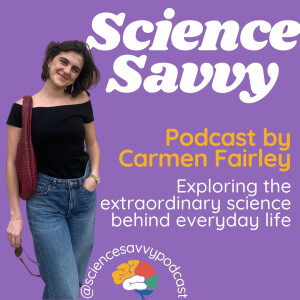
Tuesday Mar 11, 2025
Food for Thought: How What You Eat Shapes Your Mind, Body, and Relationships
Welcome to the Food and the Brain episode, part of Science Savvy with Carmen. In this episode, I explore how the food we eat shapes not only our physical health but also our brain, behavior, and social bonds. With my background in pharmacology and biomedical engineering, I break down the science behind nutrition and neurobiology and unpack how it shows up in your daily life.
This episode covers how taste, smell, and texture stimulate the brain’s reward system, the role of the gut-brain axis in mood and cognition, and how specific nutrients like omega-3s can support mental clarity. I’m joined by Pablo and Alicia, a food-loving couple who bring their own flavor to a discussion on how food influences everything from cravings and memory to connection and romance. Whether you're interested in brain health, emotional eating, or the microbiome, this episode offers clear and engaging insights grounded in real research.
Science Savvy helps you understand the systems shaping your thoughts, health, and behavior. If you're ready to explore your body and brain with a little more clarity, you're in the right place.
Further reading and references:
Swanson, D., Block, R., & Mousa, S. A. (2012). Omega-3 fatty acids EPA and DHA: Health benefits throughout life. Advances in Nutrition, 3(1), 1–7. https://doi.org/10.3945/an.111.000893
Carabotti, M., Scirocco, A., Maselli, M. A., & Severi, C. (2015). The gut-brain axis: Interactions between enteric microbiota, central and enteric nervous systems. Annals of Gastroenterology, 28(2), 203
Yano, J. M., Yu, K., Donaldson, G. P., et al. (2015). Indigenous bacteria from the gut microbiota regulate host serotonin biosynthesis. Cell, 161(2), 264–276. https://doi.org/10.1016/j.cell.2015.02.047
Dash, S., Clarke, G., Berk, M., & Jacka, F. N. (2015). The gut microbiome and diet in psychiatry: Focus on depression. Current Opinion in Psychiatry, 28(1), 1–6
Peterson, C. T., Sharma, V., Elmen, L., & Peterson, S. N. (2015). Immune homeostasis, dysbiosis and therapeutic modulation of the gut microbiota. Clinical and Experimental Immunology, 179(3), 363–377
Calder, P. C. (2010). Omega-3 fatty acids and inflammatory processes. Nutritional Neuroscience, 13(3), 183–188
Ruddock, H. K., Brunstrom, J. M., Vartanian, L. R., & Higgs, S. (2019). A systematic review and meta-analysis of the social facilitation of eating. American Journal of Clinical Nutrition, 110(4), 842–861
Berthoud, H. R., Münzberg, H., & Morrison, C. D. (2017). Blaming the brain for obesity: Integration of hedonic and homeostatic mechanisms. Gastroenterology, 152(7), 1728–1738. https://doi.org/10.1053/j.gastro.2016.12.050
Post, M. J. (2012). Cultured meat from stem cells: Challenges and prospects. Meat Science, 92(3), 297–301
van Huis, A., Van Itterbeeck, J., Klunder, H., et al. (2013). Edible insects: Future prospects for food and feed security. FAO Forestry Paper. FAO: Rome
No comments yet. Be the first to say something!